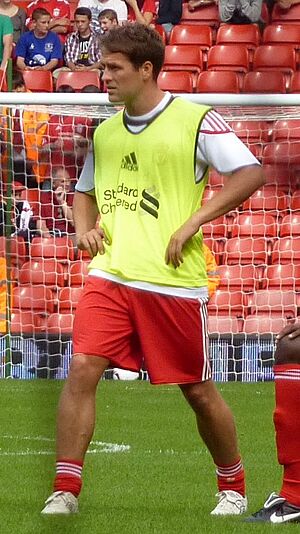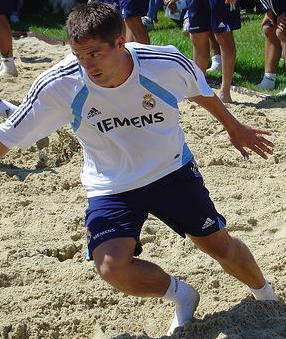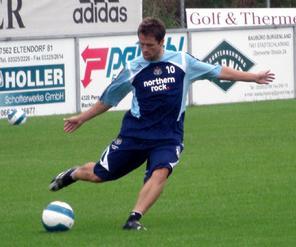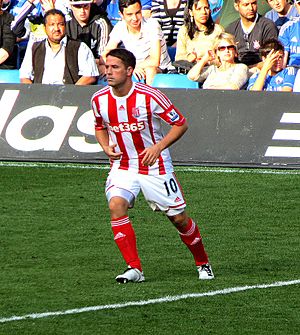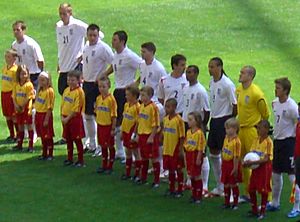Michael Owen facts for kids
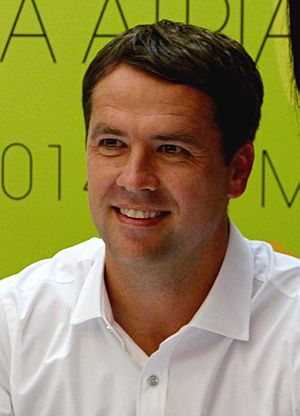
Owen in 2014
|
|||
| Personal information | |||
|---|---|---|---|
| Full name | Michael James Owen | ||
| Date of birth | 14 December 1979 | ||
| Place of birth | Chester, England | ||
| Height | 5 ft 8 in (1.73 m) | ||
| Position(s) | Striker | ||
| Youth career | |||
| Mold Alexandra | |||
| 1991–1996 | Liverpool | ||
| Senior career* | |||
| Years | Team | Apps | (Gls) |
| 1996–2004 | Liverpool | 216 | (118) |
| 2004–2005 | Real Madrid | 36 | (13) |
| 2005–2009 | Newcastle United | 71 | (26) |
| 2009–2012 | Manchester United | 31 | (5) |
| 2012–2013 | Stoke City | 8 | (1) |
| Total | 362 | (175) | |
| International career | |||
| England U15 | 8 | (15) | |
| England U16 | 11 | (15) | |
| England U18 | 14 | (10) | |
| 1997 | England U20 | 4 | (3) |
| 1997 | England U21 | 1 | (1) |
| 2006–2007 | England B | 2 | (0) |
| 1998–2008 | England | 89 | (40) |
| *Club domestic league appearances and goals | |||
Michael James Owen (born 14 December 1979) is a famous English former footballer. He played as a striker for top clubs like Liverpool, Real Madrid, Newcastle United, Manchester United, and Stoke City. He also played for the England national team.
After he stopped playing football in 2013, Michael Owen became involved in horse racing. He is now a racehorse breeder and owner. He also often works as a sports expert and commentator on TV. Many people think Owen was one of the best strikers of his time. In 2001, he won the Ballon d'Or, which is a huge award for the best player in Europe. In 2004, the legendary footballer Pelé included him in the FIFA 100 list of the world's greatest living players.
Michael Owen started his professional career at Liverpool in 1996. He was known for his amazing speed and calm way of scoring goals. He became Liverpool's youngest goalscorer in the Premier League in May 1997. In his first full season, he was the joint top scorer in the Premier League. He was Liverpool's top goal-scorer from 1997 to 2004. In 2001, Liverpool won three major trophies: the UEFA Cup, FA Cup, and Football League Cup. Owen scored 118 goals in 216 Premier League games for Liverpool.
In 2004, Owen moved to Real Madrid in Spain. He scored 13 goals there before returning to England to play for Newcastle United. After some injuries, he later joined Manchester United in 2009. He spent three years at Old Trafford before moving to Stoke City in 2012. Michael Owen is one of only ten players to have scored 150 or more goals in the Premier League. He is also the youngest player to reach 100 Premier League goals. He announced his retirement from playing in March 2013.
For England, Owen first played for the senior team in 1998. He became England's youngest player and youngest goalscorer at that time. His performance at the 1998 FIFA World Cup made him very famous. He scored in UEFA Euro 2000, the 2002 World Cup, and Euro 2004. He was the first player to score in four major tournaments in a row for England. He played in the 2006 FIFA World Cup, but got an injury that took a year to heal. He is England's 11th-most-capped player and scored 40 goals in 89 games for his country.
Contents
Early Life and Football Beginnings
Michael Owen was born in Chester, England. His father, Terry Owen, was also a professional footballer. Michael started playing football at age seven. His father quickly saw that Michael was the most talented athlete in the family.
When he was eight, Owen was chosen for the Deeside Area Primary School's Under-11 team. By age ten, he had broken a 20-year record by scoring 97 goals in one season for the same team. He also played for the youth team of Mold Alexandra. He scored on his first game for them and went on to score 34 goals in 24 games in his first season. Owen later attended Hawarden High School, where he also played for the school team.
Club Career Highlights
Liverpool Years: Youth to Stardom
Youth Career and Early Success
At 12, Michael Owen could sign a schoolboy contract with a club. Liverpool was the first big club to notice him. Their youth development officer, Steve Heighway, wrote to Owen personally. Owen's father said Michael was impressed from day one. Owen then signed with the Liverpool youth team.
At 14, Owen went to the FA's School of Excellence. He quickly played for England's youth teams, breaking scoring records with 28 goals in 20 games for the England Under-15 and Under-16 teams. He also scored many goals as he moved up through Liverpool's youth ranks.
In the 1995–96 season, Owen played for Liverpool's youth team even though he was only 16. He scored three goals (a hat-trick) against Manchester United in the FA Youth Cup quarter-finals. He scored another hat-trick in the semi-finals against Crystal Palace. Liverpool reached the final against West Ham United, who had future England stars Rio Ferdinand and Frank Lampard. Owen missed the first game but returned for the second. He scored to help Liverpool win the match 2–1. This was Liverpool's first FA Youth Cup win, and Owen was seen as the star.
Breakthrough and Golden Boots
On his 17th birthday, Owen signed a professional contract with Liverpool. He joined the senior team. On 6 May 1997, Owen scored on his Liverpool debut against Wimbledon. He became the club's youngest goalscorer.
In the 1997–98 season, Owen became Liverpool's main striker. He won the Premier League Golden Boot award for scoring the most goals. He also won the PFA Young Player of the Year award. Owen was Liverpool's top goalscorer from 1997 to 2004. He won the Premier League Golden Boot again in the 1998–99 season. However, he started to suffer from a recurring hamstring injury.
Winning the Treble and Ballon d'Or
In the 2000–01 season, Owen helped Liverpool win three trophies: the League Cup, FA Cup, and UEFA Cup. This was a huge achievement for the club. Owen scored both of Liverpool's goals in the 2001 FA Cup Final against Arsenal, helping them win 2–1.
Because of his amazing performances that season, Owen won the Ballon d'Or award. He was the first English player to win this award since 1979. In the 2001–02 season, Owen helped Liverpool challenge for the league title. He scored his 100th goal for Liverpool in December 2001. Liverpool also won the Charity Shield and the UEFA Super Cup in 2001. This meant Liverpool won five trophies in one calendar year.
Final Years at Liverpool and Transfer
Owen continued to play well in the 2002–03 season. He scored his 100th Premier League goal in April 2003. Liverpool also won the League Cup that season, with Owen scoring in the final against Manchester United. However, Liverpool did not qualify for the Champions League, which led to talk about Owen leaving.
In August 2004, Real Madrid signed Owen for £8 million. He had been Liverpool's top scorer every season since 1998.
Real Madrid Adventure
On 14 August 2004, Michael Owen officially joined Real Madrid. He wore the number 11 shirt. He played alongside famous players like Luís Figo, Zinedine Zidane, Ronaldo, and David Beckham.
Owen had a slow start at Madrid, often starting games on the bench. However, he soon found his form. He scored his first goal for the club in a Champions League game in October 2004. A few days later, he scored his first La Liga goal. On 10 April 2005, Owen scored in Real Madrid's 4–2 win over Barcelona in the famous El Clásico match. He finished the 2004–05 season with 13 goals in La Liga. He scored more goals per minute played than any other player that season. After one season, Owen decided to return to the Premier League. He scored 16 goals in 45 games for Real Madrid.
Newcastle United Chapter
Joining Newcastle and Injury Struggles
On 24 August 2005, Newcastle United announced they had agreed to sign Owen for a club record fee of £16.8 million. Owen wanted more playing time to secure his place in the England squad for the 2006 World Cup. He signed a four-year contract with Newcastle. About 20,000 fans came to St James' Park to welcome him.
Soon after signing, he got a thigh injury. He scored his first goal for Newcastle in his second game, a 3–0 win against Blackburn Rovers. On 17 December, he scored his first hat-trick for Newcastle against West Ham United. He scored one goal with his left foot, one with his right foot, and one with his head.
On 31 December 2005, Owen broke a bone in his foot. This injury kept him out of action for many months. Then, in the first minute of a World Cup game against Sweden in 2006, he badly twisted his right knee. He had torn a ligament in his knee, which meant he was out of football for almost a year. This serious injury caused a big discussion about clubs and countries sharing the cost of player injuries.
Owen started training again in February 2007. He played his first game for Newcastle in over a year on 30 April 2007. He played the full 90 minutes.
Later Years at Newcastle
Owen continued to face injuries. In July 2007, he got a thigh injury in training. In late September 2007, he needed an operation for a double hernia. In November 2007, he suffered another thigh strain while playing for England.
Despite the injuries, Owen became team captain for Newcastle in January 2008. He scored his 150th Premier League goal in February 2008. He finished the 2007–08 season with 11 goals.
In the 2008–09 season, Owen played more consistently. He scored the winning goal in his first game back from injury against Bolton Wanderers. However, it was a very difficult season for Newcastle. On the final day of the season, 24 May 2009, Newcastle was relegated from the Premier League. Owen decided not to sign a new contract with Newcastle. He later said he regretted moving to Newcastle and had hoped to return to Liverpool.
Manchester United Era
Surprise Move and Debut Season
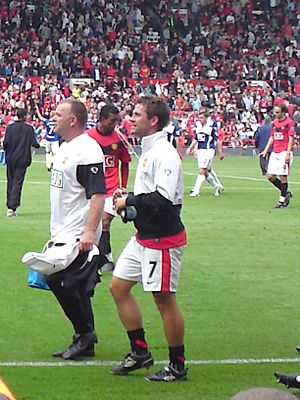
On 3 July 2009, it was announced that Owen had signed a two-year deal with Manchester United. This was a surprise move because Manchester United is a big rival of Liverpool. Owen said that manager Alex Ferguson's offer came "out of the blue". He was given the famous number 7 shirt, which had been worn by many United legends like George Best and David Beckham.
Owen scored his first goal for United on his debut in a friendly game. He scored his first competitive goal for Manchester United against Wigan Athletic on 22 August. On 20 September, Owen scored a dramatic winning goal in the sixth minute of extra time against local rivals Manchester City. This gave United a 4–3 win in the derby. Owen said this was one of his most important goals.
On 3 November, Owen scored his first Champions League goal for Manchester United. On 8 December 2009, Owen scored his first hat-trick for Manchester United in a 3–1 win against VfL Wolfsburg in the Champions League. On 28 February 2010, Owen scored United's first goal in their 2–1 win over Aston Villa in the 2010 League Cup final. However, he got another hamstring injury and missed the rest of the season.
Winning the Premier League
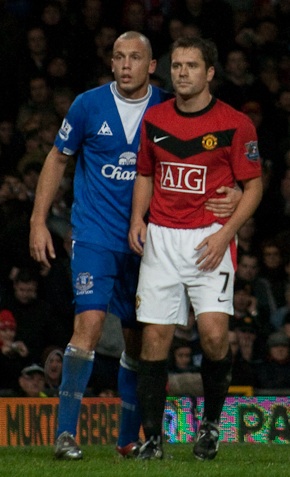
Owen returned from injury and scored his first goals of the 2010–11 season in a League Cup game in September 2010. He scored his first league goal of the season against Bolton Wanderers.
By the end of the season, Owen had played enough games to earn a Premier League winner's medal. This was his first league title in 15 seasons as a professional. Manchester United drew 1–1 with Blackburn Rovers on 14 May 2011 to win the title. Owen was an unused substitute in that game. He scored United's final goal in their last league game of the season against Blackpool. Owen signed a one-year extension to his contract in June 2011.
Limited Appearances and Retirement
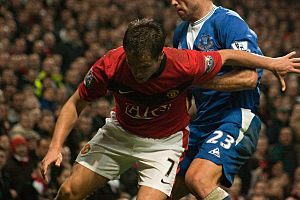
Owen started his first game of the 2011–12 season in the League Cup against Leeds United. He scored two goals in a 3–0 win. He scored again in the next round against Aldershot Town.
On 2 November, Owen started a Champions League game but had to leave early due to a thigh injury. This was his last game for Manchester United. In May 2012, Owen announced that Manchester United would not offer him a new contract. This ended his three years with the club.
Stoke City and Final Season
On 4 September 2012, Owen joined Stoke City on a one-year contract. He made his debut on 15 September. His time at Stoke was affected by a hamstring injury.
Owen scored his first and only goal for Stoke on 19 January 2013 against Swansea City. This goal made him only the seventh player to reach 150 Premier League goals.
On 19 March 2013, Owen announced that he would retire from playing football at the end of the 2012–13 season. He played only eight Premier League games for Stoke, all as a substitute. In his final game on 19 May 2013, he received a standing ovation from the fans.
International Career with England
Michael Owen played for England 89 times and scored 40 goals. He is sixth on the list of all-time top scorers for England. His 89 games also make him England's eleventh most-capped player.
Owen played for England in the 1998, 2002, and 2006 FIFA World Cups. He also played in the 2000 and 2004 UEFA European Championships. He scored goals in all but one of these tournaments. This makes him the only player to have scored in four major tournaments for England.
Becoming an England Star
Owen had a very successful youth career for England. He played for the England Under-20 team in the 1997 FIFA World Youth Championship and scored three goals. He also played once for the England Under-21 team, scoring a goal.
He made his debut for the senior England team on 11 February 1998. This made him the youngest player to represent England in the 20th century, at 18 years and 59 days old.
Owen's speed and talent made him very popular. Many fans wanted him to play in the 1998 FIFA World Cup. In a friendly game before the World Cup, Owen scored his first goal for England. This made him the youngest ever player to score for England at the time.
1998 World Cup Performance
Owen was chosen for the World Cup squad. He became England's youngest ever player at a World Cup when he came on as a substitute against Tunisia. In the next game against Romania, he scored to become England's youngest ever goalscorer in the tournament.
Because of his impact, Owen started the next game against Colombia. He kept his place for the second-round match against Argentina. After Argentina scored, Owen was fouled for a penalty, which Alan Shearer scored. In the 16th minute, Owen scored an amazing individual goal. He ran past defenders and shot the ball into the net from outside the box. In 2013, this goal was voted as the third-greatest in England's history. England later lost the game on penalties, but Owen successfully scored his penalty kick. At the end of 1998, he won the BBC Sports Personality of the Year award.
Euro 2000 and 2002 World Cup
Owen became a regular player for England in the Euro 2000 qualifiers. At the finals, Owen scored one goal, but England was knocked out early.
After Alan Shearer retired, Owen became England's main striker under new manager Sven-Göran Eriksson. He scored six goals during 2002 World Cup qualifying. This included three goals (a hat-trick) against Germany in a famous 5–1 win. His performances led him to be named European Footballer of the Year for 2001.
In April 2002, Owen was named England's captain for a friendly match. He was the youngest England captain since 1963. At the 2002 World Cup finals, Owen scored against Denmark in the second round. He then scored an early goal against Brazil in the quarter-finals, but England lost 2–1.
Euro 2004 and 2006 World Cup
Owen scored five goals in qualification for Euro 2004. At the tournament, he scored in the quarter-final against Portugal. This made him the first England player to score in four major tournaments in a row. England lost that game on penalties.
In qualification for the 2006 World Cup, Owen scored five goals. In May 2005, he scored his second international hat-trick in a friendly game against Colombia. In November 2005, he scored two late goals to give England a 3–2 win over Argentina.
Owen started England's first two games of the 2006 World Cup. However, in his third game against Sweden, he badly twisted his right knee after only 51 seconds. A scan confirmed he had torn a ligament, and he had to leave the tournament. In 2009, Owen said that all his later injuries were linked to this one.
Final England Appearances
Owen had surgery on his knee and was out until April 2007. He missed England's first six games in qualifying for Euro 2008. He returned to play for England in June 2007 and scored against Estonia. This broke Gary Lineker's record for most goals in competitive international games for England.
On 12 September 2007, Owen scored twice for England in a 3–0 win over Russia. These were his final goals for England. After England failed to qualify for Euro 2008, Owen made only one more appearance for England in March 2008.
Playing Style
When he was at his best, Michael Owen was known for his incredible speed, quick reactions, and skill. He was also very good at scoring goals. Many people consider him one of the best English strikers of his time. He was a powerful and accurate finisher, and he could also score with his head, even though he wasn't very tall. He was also good at passing and creating chances for his teammates.
However, Owen faced many injuries throughout his career. These injuries affected his speed, fitness, and overall performance in his later years.
Personal Life
Michael Owen met his wife, Louise Bonsall, in primary school. They got engaged in 2004 and married in 2005. They have four children: Gemma Rose (born 2003), James Michael (born 2006), Emily May (born 2007), and Jessica (born 2010).
Owen enjoys horse racing and owns many racehorses. One of his horses, Brown Panther, won a major race in 2011 and the 2015 Dubai Gold Cup.
Owen has appeared in several advertisements, including for breakfast cereal and washing powder. He was also on the cover of the video game Pro Evolution Soccer 2008. He has been an ambassador for the Swiss watchmaker Tissot and has a contract with car manufacturer Jaguar.
Owen also appeared as himself in the children's TV show Hero to Zero. In the show, he would come out of a poster to give advice to a character named Charlie Brice.
In January 2022, Owen appeared on the TV show The Masked Singer as "Doughnuts". He was unmasked as the seventh contestant.
In June 2022, his oldest daughter, Gemma, took part in the TV reality show Love Island and finished in second place.
In January 2024, Owen shared that his son James was diagnosed with Stargardt disease, an eye condition, when he was eight years old.
Career Statistics
Club
| Club | Season | League | National Cup | League Cup | Europe | Other | Total | |||||||
|---|---|---|---|---|---|---|---|---|---|---|---|---|---|---|
| Division | Apps | Goals | Apps | Goals | Apps | Goals | Apps | Goals | Apps | Goals | Apps | Goals | ||
| Liverpool | 1996–97 | Premier League | 2 | 1 | 0 | 0 | 0 | 0 | 0 | 0 | — | 2 | 1 | |
| 1997–98 | Premier League | 36 | 18 | 0 | 0 | 4 | 4 | 4 | 1 | — | 44 | 23 | ||
| 1998–99 | Premier League | 30 | 18 | 2 | 2 | 2 | 1 | 6 | 2 | — | 40 | 23 | ||
| 1999–2000 | Premier League | 27 | 11 | 1 | 0 | 2 | 1 | — | — | 30 | 12 | |||
| 2000–01 | Premier League | 28 | 16 | 5 | 3 | 2 | 1 | 11 | 4 | — | 46 | 24 | ||
| 2001–02 | Premier League | 29 | 19 | 2 | 2 | 0 | 0 | 10 | 5 | 2 | 2 | 43 | 28 | |
| 2002–03 | Premier League | 35 | 19 | 2 | 0 | 4 | 2 | 12 | 7 | 1 | 0 | 54 | 28 | |
| 2003–04 | Premier League | 29 | 16 | 3 | 1 | 0 | 0 | 6 | 2 | — | 38 | 19 | ||
| Total | 216 | 118 | 15 | 8 | 14 | 9 | 49 | 21 | 3 | 2 | 297 | 158 | ||
| Real Madrid | 2004–05 | La Liga | 36 | 13 | 4 | 2 | — | 5 | 1 | — | 45 | 16 | ||
| Newcastle United | 2005–06 | Premier League | 11 | 7 | 0 | 0 | 0 | 0 | 0 | 0 | — | 11 | 7 | |
| 2006–07 | Premier League | 3 | 0 | 0 | 0 | 0 | 0 | 0 | 0 | — | 3 | 0 | ||
| 2007–08 | Premier League | 29 | 11 | 3 | 1 | 1 | 1 | — | — | 33 | 13 | |||
| 2008–09 | Premier League | 28 | 8 | 2 | 0 | 2 | 2 | — | — | 32 | 10 | |||
| Total | 71 | 26 | 5 | 1 | 3 | 3 | 0 | 0 | — | 79 | 30 | |||
| Manchester United | 2009–10 | Premier League | 19 | 3 | 1 | 0 | 4 | 2 | 6 | 4 | 1 | 0 | 31 | 9 |
| 2010–11 | Premier League | 11 | 2 | 2 | 1 | 1 | 2 | 2 | 0 | 1 | 0 | 17 | 5 | |
| 2011–12 | Premier League | 1 | 0 | 0 | 0 | 2 | 3 | 1 | 0 | 0 | 0 | 4 | 3 | |
| Total | 31 | 5 | 3 | 1 | 7 | 7 | 9 | 4 | 2 | 0 | 52 | 17 | ||
| Stoke City | 2012–13 | Premier League | 8 | 1 | 1 | 0 | 0 | 0 | — | — | 9 | 1 | ||
| Total | 362 | 163 | 28 | 12 | 24 | 19 | 63 | 26 | 5 | 2 | 482 | 222 | ||
International
| National team | Year | Apps | Goals |
|---|---|---|---|
| England | 1998 | 12 | 4 |
| 1999 | 6 | 1 | |
| 2000 | 6 | 3 | |
| 2001 | 8 | 6 | |
| 2002 | 12 | 5 | |
| 2003 | 9 | 5 | |
| 2004 | 13 | 4 | |
| 2005 | 9 | 7 | |
| 2006 | 5 | 1 | |
| 2007 | 8 | 4 | |
| 2008 | 1 | 0 | |
| Total | 89 | 40 | |
- Scores and results list England's goal tally first, score column indicates score after each Owen goal.
| No. | Date | Venue | Opponent | Score | Result | Competition |
|---|---|---|---|---|---|---|
| 1 | 27 May 1998 | Stade Mohamed V, Casablanca | 1–0 | 1–0 | 1998 King Hassan II International Cup Tournament | |
| 2 | 22 June 1998 | Stade de Toulouse, Toulouse | 1–1 | 1–2 | 1998 FIFA World Cup | |
| 3 | 30 June 1998 | Stade Geoffroy-Guichard, Saint-Étienne | 2–1 | 2–2 (3–4p) | 1998 FIFA World Cup | |
| 4 | 14 October 1998 | Stade Josy Barthel, Luxembourg City | 1–0 | 3–0 | UEFA Euro 2000 qualification | |
| 5 | 4 September 1999 | Wembley Stadium, London | 6–0 | 6–0 | UEFA Euro 2000 qualification | |
| 6 | 27 May 2000 | Wembley Stadium, London | 1–0 | 1–1 | Friendly | |
| 7 | 20 June 2000 | Stade du Pays de Charleroi, Charleroi | 2–1 | 2–3 | UEFA Euro 2000 | |
| 8 | 2 September 2000 | Stade de France, Paris | 1–1 | 1–1 | Friendly | |
| 9 | 24 March 2001 | Anfield, Liverpool | 1–1 | 2–1 | 2002 FIFA World Cup qualification | |
| 10 | 28 March 2001 | Qemal Stafa, Tirana | 1–0 | 3–1 | 2002 FIFA World Cup qualification | |
| 11 | 1 September 2001 | Olympic Stadium, Munich | 1–1 | 5–1 | 2002 FIFA World Cup qualification | |
| 12 | 3–1 | |||||
| 13 | 4–1 | |||||
| 14 | 5 September 2001 | St James' Park, Newcastle | 1–0 | 2–0 | 2002 FIFA World Cup qualification | |
| 15 | 17 April 2002 | Anfield, Liverpool | 1–0 | 4–0 | Friendly | |
| 16 | 21 May 2002 | Jeju World Cup Stadium, Seogwipo | 1–0 | 1–1 | Friendly | |
| 17 | 15 June 2002 | Stadium Big Swan, Niigata | 2–0 | 3–0 | 2002 FIFA World Cup | |
| 18 | 21 June 2002 | Shizuoka Stadium, Shizuoka | 1–0 | 1–2 | 2002 FIFA World Cup | |
| 19 | 12 October 2002 | Tehelné pole, Bratislava | 2–1 | 2–1 | UEFA Euro 2004 qualification | |
| 20 | 29 March 2003 | Rheinpark Stadion, Vaduz | 1–0 | 2–0 | UEFA Euro 2004 qualification | |
| 21 | 11 June 2003 | Riverside Stadium, Middlesbrough | 1–1 | 2–1 | UEFA Euro 2004 qualification | |
| 22 | 2–1 | |||||
| 23 | 20 August 2003 | Portman Road, Ipswich | 2–0 | 3–1 | Friendly | |
| 24 | 10 September 2003 | Old Trafford, Manchester | 1–0 | 2–0 | UEFA Euro 2004 qualification | |
| 25 | 1 June 2004 | City of Manchester Stadium, Manchester | 1–0 | 1–1 | 2004 FA Summer Tournament | |
| 26 | 24 June 2004 | Estádio da Luz, Lisbon | 1–0 | 2–2 (5–6p) | UEFA Euro 2004 | |
| 27 | 18 August 2004 | St James' Park, Newcastle | 2–0 | 3–0 | Friendly | |
| 28 | 13 October 2004 | Tofik Bakhramov Stadium, Baku | 1–0 | 1–0 | 2006 FIFA World Cup qualification | |
| 29 | 26 March 2005 | Old Trafford, Manchester | 2–0 | 4–0 | 2006 FIFA World Cup qualification | |
| 30 | 31 May 2005 | Giants Stadium, East Rutherford | 1–0 | 3–2 | Friendly | |
| 31 | 2–0 | |||||
| 32 | 3–1 | |||||
| 33 | 12 October 2005 | Old Trafford, Manchester | 1–0 | 2–1 | 2006 FIFA World Cup qualification | |
| 34 | 12 November 2005 | Stade de Genève, Geneva | 2–2 | 3–2 | Friendly | |
| 35 | 3–2 | |||||
| 36 | 3 June 2006 | Old Trafford, Manchester | 4–0 | 6–0 | Friendly | |
| 37 | 6 June 2007 | A. Le Coq Arena, Tallinn | 3–0 | 3–0 | UEFA Euro 2008 qualification | |
| 38 | 8 September 2007 | Wembley Stadium, London | 2–0 | 3–0 | UEFA Euro 2008 qualification | |
| 39 | 12 September 2007 | Wembley Stadium, London | 1–0 | 3–0 | UEFA Euro 2008 qualification | |
| 40 | 2–0 |
Honours and Awards
Liverpool
- FA Cup: 2000–01
- League Cup: 2000–01, 2002–03
- FA Charity Shield: 2001
- UEFA Cup: 2000–01
- UEFA Super Cup: 2001
Newcastle United
- UEFA Intertoto Cup: 2006
Manchester United
- Premier League: 2010–11
- League Cup: 2009–10
- FA Community Shield: 2010
Individual Awards
- Ballon d'Or: 2001
- World Soccer World Player of the Year: 2001
- ESM Team of the Year: 2000–01
- Onze d'Argent: 2001
- BBC Sports Personality of the Year: 1998
- Premier League Golden Boot: 1997–98, 1998–99
- Premier League Player of the Season: 1997–98
- PFA Young Player of the Year: 1997–98
- PFA Team of the Year: 1997–98 Premier League
- Premier League Player of the Month: August 1998
- FIFA World Cup Best Young Player Award: France 1998
- FIFA World Cup All-Star Team: 1998 (Reserve)
- Premier League 10 Seasons Awards: Domestic Team of the Decade
- FIFA 100
- English Football Hall of Fame: 2014
- Golden Foot: 2017, as football legend
See also
 In Spanish: Michael Owen para niños
In Spanish: Michael Owen para niños
 | Tommie Smith |
 | Simone Manuel |
 | Shani Davis |
 | Simone Biles |
 | Alice Coachman |


